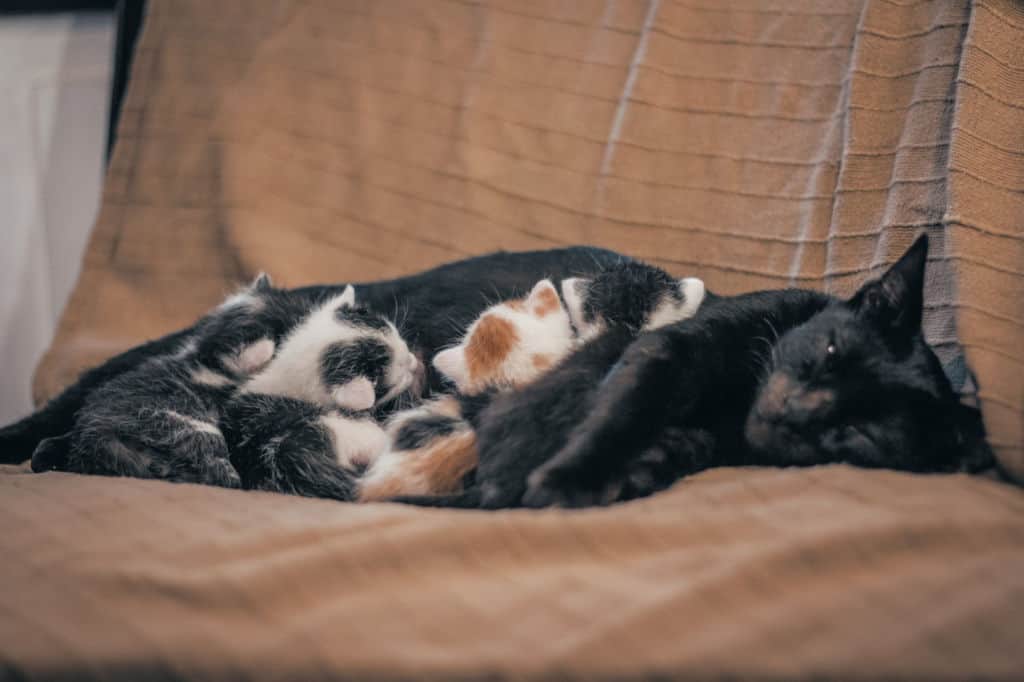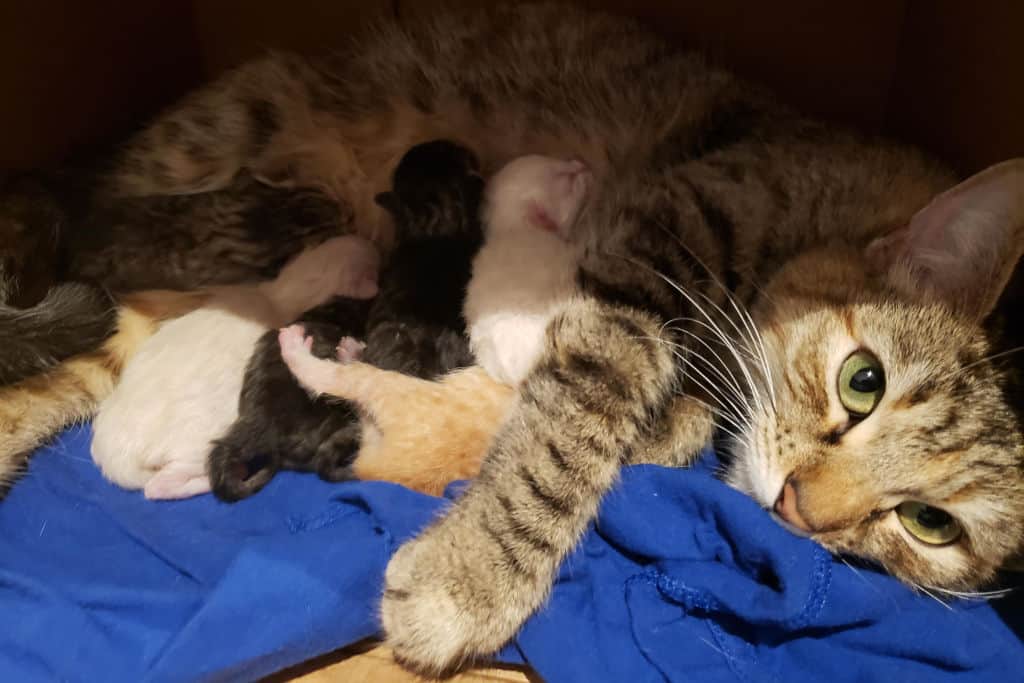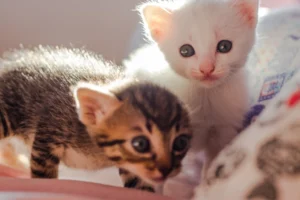Regardless of the reason for breeding a cat, knowing the best age for a cat’s pregnancy is crucial in assuring proper care for both the mother and the litter.
The ideal age for a cat to give birth to kittens varies depending on her general health, breed, and size and on a few other factors. While a cat’s fertility can begin early, waiting for the age sweet spot between one to three years significantly lowers the risk of birthing complications.

What Is the Ideal Cat Pregnancy Age?
It is generally not recommended to allow a cat to have kittens before she is one year old, as her body may not be fully developed, and she may not be physically ready for the demands of pregnancy and childbirth.
Similarly, it is generally not recommended to allow a cat to have kittens after she is five years old, as the risks of complications during pregnancy and childbirth increase with age.
Moreover, an older cat’s energy and stamina can be significantly less than in her prime years, making it challenging to manage a lively litter.
It’s important to remember that cats can get pregnant at any age, and it’s the owner’s job to take care of them and ensure they don’t breed unless they’re physically able to. This includes having cats spayed or neutered to avoid unwanted pregnancies.
How Soon Can a Cat Have Kittens?
Some cats can reach sexual maturity at a young age and have kittens as early as four months; an example is Siamese cats. However, if the cat is less than a year old, it is best to avoid having a litter. Very young females frequently struggle to cope mentally and physically with a litter.
House cats reach sexual maturity between the ages of 4 and 12 months. Most cats are physiologically ready to breed at six months. However, they are usually psychologically ready after about one to two years.
It is, therefore, best to wait until your cat is 1-2 years old before breeding.
Allowing a cat to have kittens at a young age increases the risk of complications during pregnancy and childbirth and hurts the cat’s health. Furthermore, younger cats may not have fully developed the necessary skills and instincts to care for their kittens, which can lead to feeding, grooming, and socialization issues.
At this point, the cat will still be too small, and it is difficult for the mother to carry around the litter because they are generally not strong enough. Normal pregnancy doesn’t usually require any treatment, but a mother too young may be unable to give birth, so the kittens may need to be taken out through surgery.
In contrast, a cat aged optimally between one to three years typically has developed a stronger pelvic structure, reducing the chances of surgical intervention.
Some cats have enough complications through hormonal changes and stress, and having her give birth while unprepared adds unnecessary problems to their overall well-being.
Given the global cat overpopulation, consider adopting from shelters with ready-to-home cats. I’ve adopted three cats myself. If you have a female cat, experts mostly advise spaying females by six months, before she reaches sexual maturity.

How Many Kittens Typically Survive Birth?
The number of kittens born alive can vary greatly depending on various factors, including the mother’s health and age, the size of the litter, and whether or not the birth is complicated.
In general, 70-80% of kittens survive in a litter. This means that out of a litter of, say, six kittens, it is likely that one or two will not survive.
Some outdoor cats may lose their first litter because they don’t know how to care for their first kittens. They make simple errors like not feeding them when they are hungry or laying on them and suffocating them. However, they learn from this and significantly improve on their next try. Some cats have such strong instincts that they will co-parent another cat’s kittens.
Survival rate can be lower when the mother is ill, the litter is large, or the birth is complicated. In such cases, the kittens may require veterinary care to survive.
The bottom line is that a small percentage of kittens do not survive birth, but most litters have a relatively high survival rate with proper care and attention.
How Soon After Giving Birth Can a Cat Become Pregnant Again?
Most cats enter heat (estrus) six to eight weeks after giving birth. Sometimes, a cat will have an estrus cycle within 2 to 3 weeks after her kittens are born. This means that cats can get pregnant while still nursing.
This is because cats are induced ovulators, meaning they ovulate in response to mating rather than on a regular cycle.
The gestation period (length of pregnancy) for cats is approximately two months, and it may only take a few weeks after giving birth to become pregnant again. This means that they can have up to five liters per year. If you’re unsure, there are some signs to check if your cat is pregnant.
It is generally recommended that a cat not mate for at least six to eight weeks after giving birth, as her body requires time to recover from pregnancy and childbirth fully. This will help ensure the cat stays healthy and adequately cares for her kittens.
To avoid this (as well as to prevent infections and tumors), have your cat spayed as soon as your veterinarian recommends it. Many pregnancies will likely deplete the mother, and later-born children may be less healthy than older siblings.
FAQs
How many kittens can a cat have in the first litter?
The number of kittens in a cat’s first litter can vary greatly, but most cats have litters of two to four kittens. Several factors, including a cat’s overall health, size, and breed, can influence the number of kittens she has in her first litter.
Should you touch a newborn kitten?
It is generally not recommended to handle newborn kittens excessively because their immune systems are not fully developed, and they are susceptible to infection. Vets advise against touching kittens unless necessary while their eyes remain closed.
However, it is critical to keep an eye on the kittens to ensure that they are nursing and gaining weight and provide them with the necessary care, such as cleaning and keeping them warm. To reduce the risk of infection, wash your hands thoroughly with soap and water before and after handling the kittens.
Can an old cat give birth to healthy kittens?
An older cat can give birth to healthy kittens, but there are additional risks. Cats’ bodies may become less capable of handling the physical demands of pregnancy and childbirth as they age, making them more prone to complications.
If an older cat becomes pregnant, she should be closely monitored by a veterinarian to ensure that she and the kittens are healthy.
Alex, a passionate animal lover, has experience in training and understanding animal behavior. As a proud pet parent to two dogs and three cats, he founded AnimalReport.net to share insights from animal experts and expand his knowledge of the animal kingdom.




